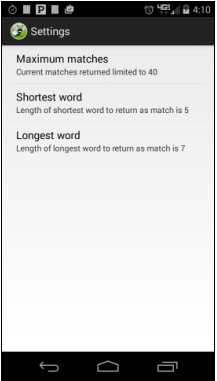Here,all these are cut from Eclipse sample SettingsActivity.
I have to copy all these too much codes to show how these android developers choose perfectly for more generalized and stable coding style.
I left the codes for adapting the PreferenceActivity to tablet and greater API.
public class SettingsActivity extends PreferenceActivity {
@Override
protected void onPostCreate(Bundle savedInstanceState) {
super.onPostCreate(savedInstanceState);
setupSummaryUpdatablePreferencesScreen();
}
private void setupSummaryUpdatablePreferencesScreen() {
// In the simplified UI, fragments are not used at all and we instead
// use the older PreferenceActivity APIs.
// Add 'general' preferences.
addPreferencesFromResource(R.xml.pref_general);
// Bind the summaries of EditText/List/Dialog preferences to
// their values. When their values change, their summaries are updated
// to reflect the new value, per the Android Design guidelines.
bindPreferenceSummaryToValue(findPreference("example_text"));
bindPreferenceSummaryToValue(findPreference("example_list"));
}
/**
* A preference value change listener that updates the preference's summary
* to reflect its new value.
*/
private static Preference.OnPreferenceChangeListener sBindPreferenceSummaryToValueListener = new Preference.OnPreferenceChangeListener() {
private String TAG = SettingsActivity.class.getSimpleName();
@Override
public boolean onPreferenceChange(Preference preference, Object value) {
String stringValue = value.toString();
if (preference instanceof ListPreference) {
// For list preferences, look up the correct display value in
// the preference's 'entries' list.
ListPreference listPreference = (ListPreference) preference;
int index = listPreference.findIndexOfValue(stringValue);
// Set the summary to reflect the new value.
preference.setSummary(
index >= 0
? listPreference.getEntries()[index]
: null);
} else {
// For all other preferences, set the summary to the value's
// simple string representation.
preference.setSummary(stringValue);
}
Log.i(TAG, "pref changed : " + preference.getKey() + " " + value);
return true;
}
};
/**
* Binds a preference's summary to its value. More specifically, when the
* preference's value is changed, its summary (line of text below the
* preference title) is updated to reflect the value. The summary is also
* immediately updated upon calling this method. The exact display format is
* dependent on the type of preference.
*
* @see #sBindPreferenceSummaryToValueListener
*/
private static void bindPreferenceSummaryToValue(Preference preference) {
// Set the listener to watch for value changes.
preference.setOnPreferenceChangeListener(sBindPreferenceSummaryToValueListener);
// Trigger the listener immediately with the preference's
// current value.
sBindPreferenceSummaryToValueListener.onPreferenceChange(preference,
PreferenceManager
.getDefaultSharedPreferences(preference.getContext())
.getString(preference.getKey(), ""));
}
}
xml/pref_general.xml
<PreferenceScreen xmlns:android="http://schemas.android.com/apk/res/android" >
<!-- NOTE: EditTextPreference accepts EditText attributes. -->
<!-- NOTE: EditTextPreference's summary should be set to its value by the activity code. -->
<EditTextPreference
android:capitalize="words"
android:defaultValue="@string/pref_default_display_name"
android:inputType="textCapWords"
android:key="example_text"
android:maxLines="1"
android:selectAllOnFocus="true"
android:singleLine="true"
android:title="@string/pref_title_display_name" />
<!-- NOTE: Hide buttons to simplify the UI. Users can touch outside the dialog todismiss it.-->
<!-- NOTE: ListPreference's summary should be set to its value by the activity code. -->
<ListPreference
android:defaultValue="-1"
android:entries="@array/pref_example_list_titles"
android:entryValues="@array/pref_example_list_values"
android:key="example_list"
android:negativeButtonText="@null"
android:positiveButtonText="@null"
android:title="@string/pref_title_add_friends_to_messages" />
</PreferenceScreen>
values/strings_activity_settings.xml
<resources>
<!-- Strings related to Settings -->
<!-- Example General settings -->
<string name="pref_title_display_name">Display name</string>
<string name="pref_default_display_name">John Smith</string>
<string name="pref_title_add_friends_to_messages">Add friends to messages</string>
<string-array name="pref_example_list_titles">
<item>Always</item>
<item>When possible</item>
<item>Never</item>
</string-array>
<string-array name="pref_example_list_values">
<item>1</item>
<item>0</item>
<item>-1</item>
</string-array>
</resources>
NOTE: Actually I just want to comment like "Google's sample for PreferenceActivity is also interesting". But I haven't enough reputation points.So please don't blame me.
(Sorry for bad English)

